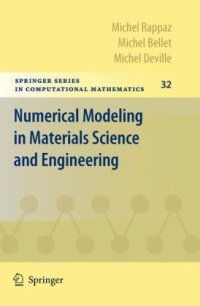
Ebook: Numerical Modeling in Materials Science and Engineering
- Genre: Physics
- Tags: Computational Mathematics and Numerical Analysis, Characterization and Evaluation of Materials, Mechanical Engineering, Condensed Matter Physics
- Series: Springer Series in Computational Mathematics
- Year: 2003
- Publisher: Springer-Verlag Berlin Heidelberg
- Edition: 1
- Language: English
- pdf
This book introduces the concepts and methodologies related to the modelling of the complex phenomena occurring in materials processing. After a short reminder of conservation laws and constitutive relationships, the authors introduce the main numerical methods: finite differences, finite volumes and finite elements. These techniques are developed in three main chapters of the book that tackle more specific problems: phase transformation, solid mechanics and fluid flow. The two last chapters treat inverse methods to obtain the boundary conditions or the material properties and stochastic methods for microstructural simulation. This book is intended for undergraduate and graduate students in materials science and engineering, mechanical engineering and physics and for engineering professionals or researchers who want to get acquainted with numerical simulation to model and compute materials processing.
With the increased power and availability of computers, computer aided modeling is becoming more prevalent in various fields of engineering. One important example is modelling of stress, strain, and flow (plastic solid and liquid) at the continuum level. Examples of this are finite element analysis, finite difference analysis, Monte Carlo simulations, and the random walk. This book covers all of these topics and generally serves as a good introductory textbook to learn about modelling at the continuum scale. The mathematical treatment is very brisk though, and requires prior knowledge of linear and partial differential equations, linear algebra, and basic computing.